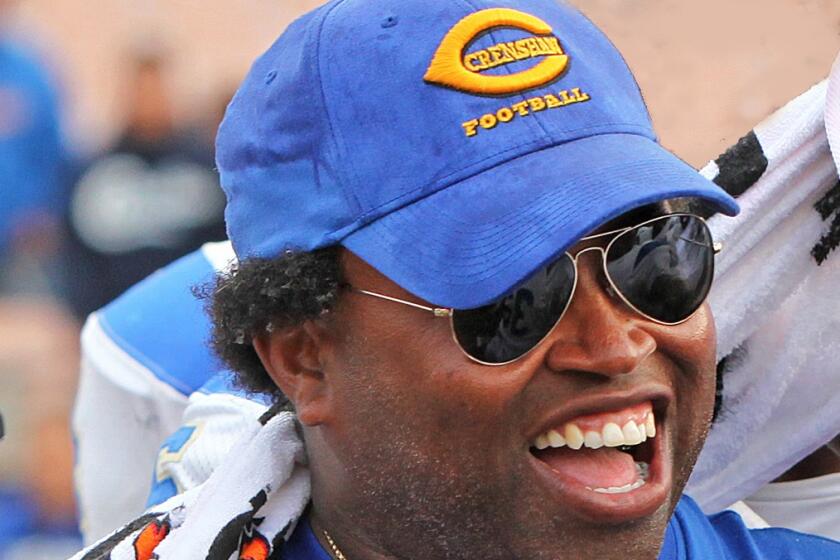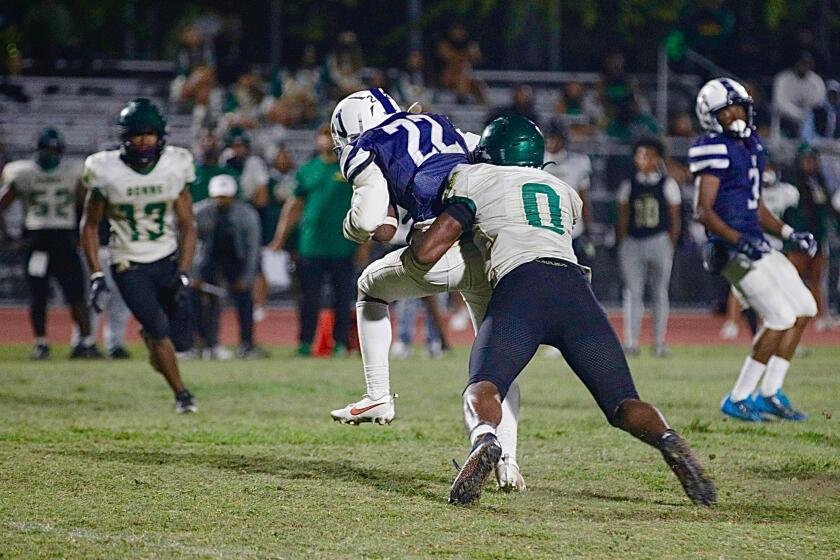They Also Serve Who Just Sit and Read
One of the stories was about a little boy who declares himself to be the best baseball player in the world. Then he tosses his ball into the air, swings his bat--and misses. Again he declares his greatness. Again he swings and misses. After strike three, the little boy is undaunted: âWhat a great pitcher!â
Another concerned the storytellerâs relationship with a bag lady. For months the writer--a woman, if memory serves--notices the old woman on the street, huddled in her clothing, her thoughts, her isolation. Then one day--at Thanksgiving, I think it was--she offers the old woman the gift of a meal. Oh, thank you, the old woman says brightly, but why donât you give it to someone who needs it? And with that the woman closes her eyes, returning to her private world.
The little yarns are âChicken Soup for the Soul,â a collection of inspirational, poignant anecdotes. I read them aloud and on tape in a Hollywood sound booth last weekend as a participant in Recording for the Blindâs Record-a-Thon, a fund raiser featuring a competition of long-distance readers. RFB volunteer David Gelman was on the other side of the glass, monitoring and recording my words for posterity.
Last year, Gelman recorded James Earl Jones in the same sound studio.
The Record-a-Thon was scheduled to last 24 hours. I read for about 15 minutes--and Iâd rather not think this was my 15 minutes of fame. The throat was getting dry, but I felt like I was getting the hang of it. Me and James Earl Jones. Now if only I could get some voice-over work. . .
*
Alas, there seems to be a lot of competition. Max Flehinger of Tarzana always wanted to be a radio announcer. Instead he put in 30 years as a dentist and now, at 63, works as a financial planner. And for the last six years, heâs lent his time and voice to expanding RFBâs 80,000-plus library.
Because of his medical background, Flehinger specializes in reading medical texts. Heâs part of a team of readers who have been recording an anesthesia text for 1 1/2 years. âItâs the longest book in the world,â he says. âAt least it certainly seems like that.â
Flehinger insists this is a good time. âI do it,â he says, âbecause itâs really fun.â
Itâs nice when a peculiar sense of enjoyment coincides with a good cause. Such enterprises as Books-on-Tape make money. But you need volunteers to narrate a textbook.
I first learned about RFB a year ago when Gelman, a Panorama City resident, invited me to the agencyâs Hollywood recording studios. A volunteer for several years, he wanted to help RFB get some ink. Founded in 1948 as a way of helping war veterans take advantage of the GI Bill, RFB has been so obscure that Gelman has met blind people who were unaware of the service. Many people wrongly assumed it was a subsidiary of the Braille Institute.
People who were born blind or became blind young tend to learn Braille. RFB, which has more than 30,000 clients nationwide, serves people who lost their eyesight later in life, or have learning disabilities such as dyslexia. Indeed, so many dyslexics are using the service that, as of July 1, the agencyâs name officially will become Reading for the Blind and Dyslexic to better reflect its clientele.
Intrigued by a public service announcement, Max Flehinger and his wife, Elle, became involved six years ago--so involved that, during one year, Max served as board chairman in Los Angeles. Elle, a dental hygienist and an instructor at USC, said the RFB became âa new family.â
Elle doesnât read or monitor. But her chicken soup with matzo balls helped energize the Record-a-Thon readers. And she does a little recruiting, especially with people approaching retirement.
âWhen I have patients in the chair and their mouths are open, I say, âWhat are you going to do?â â Then she gives them the pitch.
âPeople donât talk back,â she explains, âwhen you have sharp things in their mouth.â
*
These days, Max Flehinger doesnât drive to Hollywood to read or monitor. Since March, heâs gone to RFBâs new studio in West Hills.
I participated in the Record-a-Thon as a guest. Flehinger was a competitor with other long-distance readers. For the first 12 hours they only had one 10-minute break every two hours to eat or use the bathroom. Flehinger dropped out after 12 hours. In this marathon, Flehinger suggests, âI was the rabbit.â
Others kept at it, defying fatigue. In the end, Mike Senzer of Van Nuys and Michael Savage of North Hollywood read for 27 hours.
Senzer read from a book on foreign policy and the memoir of a veteran who overcame post-traumatic stress syndrome. Savage read from a text on business management, a World War II novel and something about gay rights called âFear of a Queer Planet.â
âTheyâre both competitive types,â says Carol Smith, RFBâs executive director. At 9 a.m. Sunday, the Record-a-Thon was supposed to end, but Senzer and Savage insisted on pressing forward. At noon, Smith decided to call it a draw.
âWe had staff people here who had not slept and had to work the next day,â she said. âIt became an issue of the good of the organization versus the vanity of these die-hards.â
Max Flehinger, having read 12 hours, could appreciate their feat. But what really impressed him was the fact that for the last 12 hours, from midnight until noon, Senzer and Savage read on and on without a single break.
No eating, no napping, no visiting the bathroom.
And to think, they might have even thought it was fun.
Scott Harrisâ column appears Tuesdays, Thursdays and Sundays.
More to Read
Go beyond the scoreboard
Get the latest on L.A.'s teams in the daily Sports Report newsletter.
You may occasionally receive promotional content from the Los Angeles Times.










